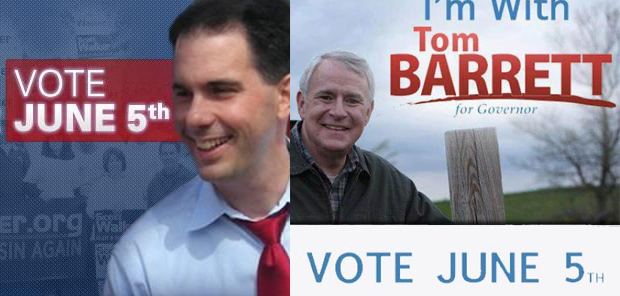Milwaukee Could Decide Race
Without a high county turnout, Tom Barrett is toast.
The theory, as promoted by his Republican fans, was that 2010 gubernatorial candidate Scott Walker would kick butt in the Democratic stronghold of Milwaukee County. After all, he had won three straight non-partisan races for County Executive there.
But the reality was something quite different. In the partisan race for governor, Democrats voted their party and then some: Milwaukee Mayor Tom Barrett thumped Walker, getting a whopping 62 percent of this county’s vote in 2010.
That should have been enough for Barrett to win the state. Going back to 1980, Democrats had been victorious in 17 straight races for president, governor or U.S. Senator when they gained at least 60 percent of Milwaukee County’s vote. But Walker made up the difference in other counties, gaining 52 percent of the vote statewide.
The combined margin of the three counties for Walker was more than 128,000 votes, nearly canceling out Barrett’s 131,000-vote edge in Milwaukee, the state’s biggest county. By contrast, in the 2008 race for president, the three Republican counties went for John McCain by some 94,000 votes, which was dwarfed by Barack Obama’s margin of 169,000 in Milwaukee County. These two races represent extremes: in a typical election the four-county metro area should provide a solid advantage for Democrats.
Because Milwaukee has a large population of low-income and minority voters, who are less likely to vote in non-presidential elections, its turnout is always lower. Thus, the turnout in the May recall primary was just 28 percent in Milwaukee County, versus 38 to 39 percent in the three adjoining Republican counties. That difference is all the more striking given that the Democratic primary was a hotly contested race between Barrett and Kathleen Falk whereas Walker faced a token opponent.
Indeed, more voters showed up in metro Milwaukee’s Republican ring of counties than in the political hotbed of Dane County, with a 36 percent turnout.
Can Democrats pump up their turnout? Analysts have begun to talk darkly of “recall fatigue” among the Dems. An online Time article suggests the Democratic coalition is splintering. Politico says the Dems are limping to the finish line. Even The Cap Times sunny uber-lefty John Nichols has despaired, saying the Democrats’ muddled message is hurting them.
Perhaps. On the other hand, as one Democratic strategist told Politico, “One of the things we found when we polled is one message doesn’t work. It’s not a referendum on collective bargaining. There’s the jobs front, the women front, the John Doe… you’ve got to hit on all these things.”
Barrett’s speech on election night touched on all these issues, while hammering the idea of Walker fomenting an “ideological civil war.” I still think that’s the strongest message, though Walker’s “divide and conquer” remark has given a keener edge to the issue of collective bargaining, suggesting Walker would sign legislation to slash private-sector union rights. (Nichols makes a good case for not letting the union issue be obscured.)
But I think all the weeping and gnashing of teeth is overdone. The sum total of all the polls suggests the race is a dead heat. Yes, Walker has managed to blur the jobs issue, but that was never going to be definitive in this race. It’s all the other Democratic issues that have more sting. The number people signing the recall petition (which likely includes a couple hundred thousand who typically don’t vote in elections) shows how much anti-Walker sentiment is out there. The challenge for Dems is getting enough of these folks to turn out.
The high participation by Republicans in the May primary didn’t happen by magic. As Ben Sparks, communications director for the state Republican Party notes, “we’ve done more than 2 million voter contact calls since January. We’ve already surpassed what we did in 2010.”
But those two million calls came in the four months before the May primary, raising the question of how much they can increase that turnout in the four weeks before the general election. Democrats can’t compete with the GOP money, but with union members and others helping out, their ground game can still get out the vote in Milwaukee and Dane counties. The Milwaukee turnout, in particular, could decide the next governor.
And don’t miss the latest from the AlderBobs: Did Donovan make Bauman soil his pants?
Murphy's Law
-
National Media Discovers Mayor Johnson
 Jul 16th, 2024 by Bruce Murphy
Jul 16th, 2024 by Bruce Murphy
-
Milwaukee Arts Groups in Big Trouble
 Jul 10th, 2024 by Bruce Murphy
Jul 10th, 2024 by Bruce Murphy
-
The Plague of Rising Health Care Costs
 Jul 8th, 2024 by Bruce Murphy
Jul 8th, 2024 by Bruce Murphy




















How is Walker’s trashing of Milwaukee, “Barrett wants to make the whole state like Milwaukee. Wisconsin doesn’t want to be like Milwaukee,” going to play in Beertown? I would think there might be a rush to the polls to deliver a collective, “Yo’ Momma,”
One small thing that supporters of Barrett can do is to put up Barrett yard signs, especially along streets that get a lot of traffic. If you know of someone who lives on a street that gets a lot of traffic, encourage them to put up a yard sign or get one for them. Another thing is to make sure your relatives, friends and acquaintances know that they can vote early, but not after Friday, June 1. After that they will have to vote on June 5, but who knows what the weather will be like on that day? Also, some people who have misgivings about the recall may need to talk this thru with someone. Choosing not to vote out of concerns about the recall is of course equivalent to a vote for Walker. Fears that there are just going to be recall after recall are not warranted. They are too hard to carry out. Walker is right about one thing, this election is about Wisconsin’s future so anyone concerned about the recall should listen to their governor and vote for his early retirement.
My reading of an early poll on attitudes towards collective bargaining (I have not seen any recent polls that addressed this question) is that a majority of Wisconsin voters believe that Walker went too far in Act 10. But a majority also does not support returning to the situation that existed before. If so, the Democrats need to present a vision for what collective bargaining should look like in the future. Dangerous, because they risk antagonizing the unions, but their silence allows Walker to paint them as planning to return to the status quo.